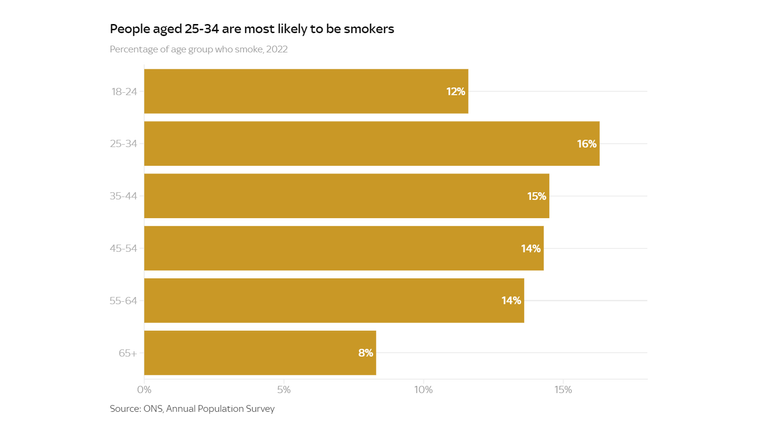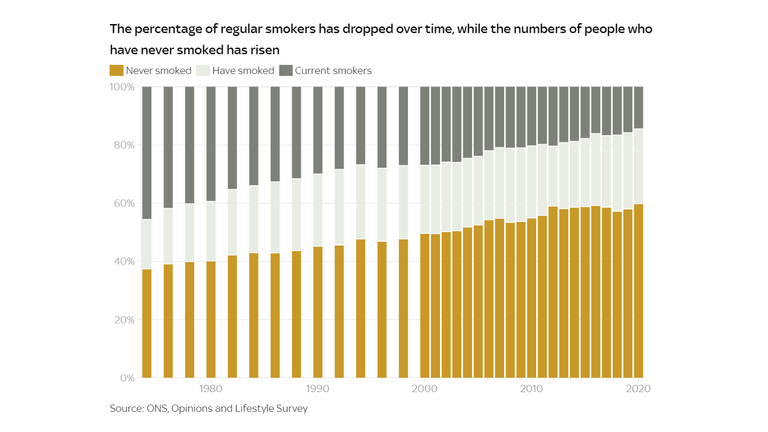The government has said it is considering banning smoking in pub gardens and other outdoor areas.
Prime Minister Sir Keir Starmer confirmed the proposal is in the works on Thursday, following reports in The Sun.
He says the measures are aimed at reducing the 80,000 preventable deaths from smoking in the UK each year.
Labour also wants to continue with the previous government's plans to create a 'smoke-free generation' by banning the sale of cigarettes in the future to anyone 14 or under.
While details of the new plans are still in the works, here's what we know so far and how the ban might work.
How would the outdoor ban work?
Smoking has been illegal in enclosed public places and workplaces since 2007 in England, Wales, and Northern Ireland - and since 2006 in Scotland.
The current bans do not cover vapes.
Breaking the law on smoking in workplaces carries a £200 maximum fine in England, Wales and Northern Ireland - and £50 in Scotland. Businesses can be given penalties of up to £2,500 for failing to enforce the rules.
An outdoor ban would likely apply the same rules to most outdoor spaces - including some parks, all pub gardens, outdoor restaurants, sports venues, and areas outside nightclubs and hospitals.
Details on all the venues covered by the proposal and what the fines would be are yet to be released.
Why has the ban been proposed?
When asked to confirm the outdoor ban rumours, the prime minister said: "My starting point on this is to remind everyone that over 80,000 people lose their lives every year to smoking, that's a preventable death, it's a huge burden on the NHS and of course to the taxpayer".
He promised to "take decisions in this space" to "reduce the burden on the NHS and the taxpayer".
Smoking is the UK's biggest preventable killer, causing around one in four cancer deaths and leading to 64,000 deaths per year in England, according to Dr Javed Khan's 2022 review into making smoking obsolete.
It is hoped the plans will prevent tens of thousands of deaths and save the NHS billions of pounds.
Will it work?
Hospitality businesses are sceptical the plans are enforceable, however.
Reem Ibrahim, acting director of communications at the Institute of Economic Affairs thinktank, said they would be "another nail in the coffin for the pub industry".
"Pubs and other private venues should be able to determine their own outdoor smoking rules - just as they should be allowed to decide whether to play music, serve food or show football on TV," he added.
Kate Nicholls, chief executive of UKHospitality echoed his concerns, saying the plans will also affect hotels, cafes, and restaurants.
She pointed to the number of pub closures after the indoor smoking bans of 2006 and 2007 - and called for businesses to be consulted before any measures are implemented.

What about 14s and under?
Rishi Sunak's Conservative government proposed to ban anyone who was born on or after 1 January 2009 from buying cigarette or tobacco products.
This would effectively raise the legal age for buying cigarettes in England by one year every year, until it applies to the whole population.
Labour has said it will continue with the plans, laying out the Tobacco and Vapes Bill in the King's Speech in July.
This will also include limits on the sale and marketing of vapes - but exact details have not been published yet.
As with previous plans, smoking would not be criminalised. Instead, the phased approach means those who are already old enough to buy cigarettes will be able to carry on doing so.
Older people, however, may have to carry ID if they want to buy cigarettes when the law changes.
Will the under-14 ban stop young people smoking?
There is "excellent evidence" increasing the legal age for buying tobacco from 16 to 18 in the UK "substantially reduced smoking prevalence", according to Jamie Brown, professor of behavioural science at University College London (UCL).
"This provides good reason to expect this measure to have a similar impact," he said.
Simon Clark, director of the smokers' group Forest, said the ban was "creeping prohibition" and will not work.
"Anyone who wants to smoke will buy tobacco abroad or from illicit sources," he said.
Are there any similar bans around the world?
New Zealand passed a similar ban, but it was repealed by the country's new coalition government before it came into force.

How much of the population will be affected?
In 2022, 12.9% of the adult UK population (6.4 million people) were smokers, according to the Office for National Statistics (ONS).
As for the 'smoke-free generation', 21% of the UK population is currently not allowed to buy cigarettes due to their age.
But assuming the age of sale rises to 19 in 2027, and increases by one year every year after that, the proportion of the population below the age of sale will reach 30% in 2035, 40% in 2044 and 50% in 2053.

The ban only covers England - what about the other UK nations?
The legal smoking age is a devolved issue, so the governments of Scotland, Wales and Northern Ireland set their own laws around it.
Depending on what laws the other nations adopt, there could be a situation where is it illegal for someone to buy cigarettes or smoke in pub gardens in England, but legal across the border.
Keep up with all the latest news from the UK and around the world by following Sky News
Tap hereWhat are the next steps?
In the King's Speech at the opening of the new parliament, Labour said the Tobacco and Vapes Bill would be introduced by the end of this year.
As with all legislation, it will need to be approved in the House of Commons and the House of Lords before being written into law.
If the government wants to stop people smoking, why not just ban cigarettes?
Banning tobacco outright would not immediately stop the UK's 6.4 million smokers from smoking, Dr Sarah Jackson from UCL explains.
"Because cigarettes are so highly addictive, many people would be unable or unwilling to do so, and a ban would likely drive demand towards the illicit market," she said.
"Gradually increasing the age of sale over time... will be helpful in discouraging young people from taking up smoking in the first place."
What about vaping?
This government and the previous one have both vowed to crack down on vaping among children.
Vaping is "rightly" used as a tool to quit smoking, a spokesperson said, but they added: "The health advice is clear, if you don't smoke, don't vape and children should never vape".

The name of the new bill reveals limits will be imposed on e-cigarettes.
This could mean flavours being restricted and tighter regulations on packaging and point-of-sale displays.
The ONS reported a rise in vaping among young people, with 15.5% of 16 to 24-year-olds reporting vaping daily or on occasion in 2022, up from 11.1% in 2021.
Disclaimer: The copyright of this article belongs to the original author. Reposting this article is solely for the purpose of information dissemination and does not constitute any investment advice. If there is any infringement, please contact us immediately. We will make corrections or deletions as necessary. Thank you.





